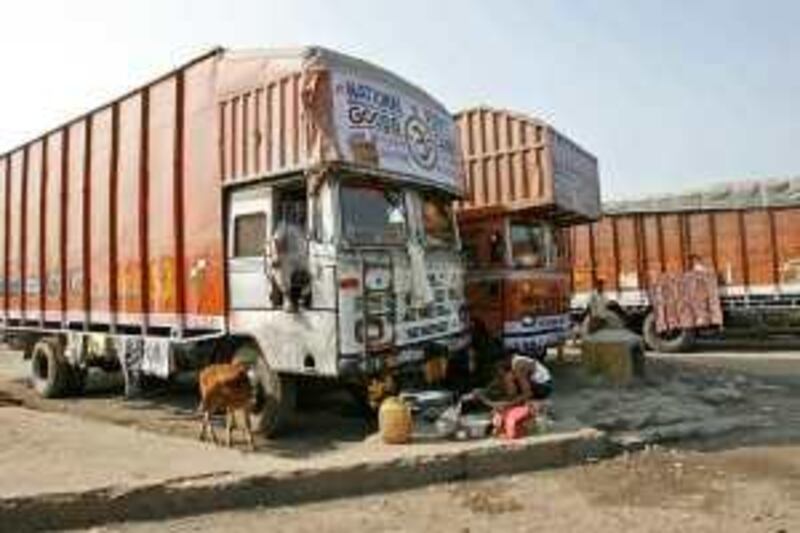Tens of thousands of lorry drivers stayed off the roads today after talks with Indian officials to cut taxes and diesel prices broke down, threatening to push up prices of food and commodities across the country. "We are on an indefinite strike until our demands are met," said Charan Singh Lohara, the president of the All India Motor Transport Congress, which says it represents six million lorry drivers.
"The government is giving concessions and bailout packages to so many industries. Why not us, when we are struggling to repay loans with high fuel prices, high prices of tyres and numerous taxes." More than 70 per cent of freight in India moves by road, and lorry drivers have benefited from a booming economy that required the transport of steel and cement, as well as an improving network of highways that encouraged demand for trucks.
But the country's 200,000 transport companies have been hit in recent months by a slowing economy, higher interest rates on vehicle loans and greater competition from the railways. Sales of trucks and buses at Tata Motors, India's top vehicle maker, fell by more than half last year from a year ago as tight credit in a traditionally weak month and a slowing economy trimmed demand. Overall vehicle sales dived an annual 47 per cent to 25,219 units, while commercial vehicle dropped an even sharper 51 per cent from a year ago. Passenger car sales fell 31 per cent.
"A deepening recessionary trend in the economy, coupled with continuing credit squeeze and high interest rates, has further depressed customer sentiments. As a result, automobile purchases are being severely impacted," Tata said. Last Thursday, the country's largest car maker, Maruti Suzuki India, in which Japan's Suzuki Motor has a 54.2 per cent stake, reported a 10 per cent drop in sales. "Automobile sales are usually modest in December because many consumers try and postpone their purchases to the new year when companies push sales trough heavy discounts and offers," Sharekhan, a brokerage, said in a note on Friday.
All vehicles makers cut prices last month after the government cut excise duty by 4 percentage points but it failed to have any impact. Top utility maker Mahindra and Mahindra saw sales fall 30 per cent. Bucking the trend, the number two car maker, Hyundai Motor India, the wholly-owned unit of Korea's Hyundai experienced an increase in sales of nearly 56 per cent last month, helped by exports, discount schemes and other incentives.
"We at HMIL have fared better as we have a strong line-up of products in the compact segment which has kept our sales steady," its sales and marketing head, Arvind Saxena, said, admitting the market was challenging. India's top three two-wheeler makers showed a further decline in sales. Sales for the top bike maker, Hero Honda Motors, fell 10 per cent, while number two, Bajaj Auto, dropped 29 per cent from a year ago.
"How can we compete when our costs are so high," Mr Lohara said. India cut prices of petrol and diesel on Dec 8 after crude oil tumbled, but the economy, Asia's third largest, has shown palpable signs of slowing after growing at 9 per cent or more in the past three years. Economists and government advisers expect expansion to moderate to around 7 per cent this fiscal year to March 31. Talks with the government would continue, Mr Lohara said, but a prolonged strike could increase prices of fruits and vegetables and disrupt supplies of other commodities.
Big retailers have stocked up and made arrangements with their own fleets to ensure supplies were not hit, said Rajan Malhotra, the chief executive of Big Bazaar in Mumbai. "We are well stocked for the next three to four days, but if the strike drags on beyond that, then we will face shortages.". A three-day strike by truck drivers last July calling for lower road tolls and cheap diesel pushed up the prices of produce.
* Reuters






